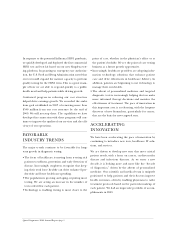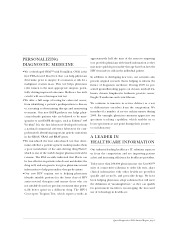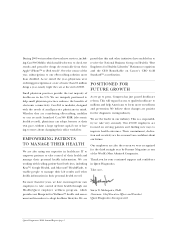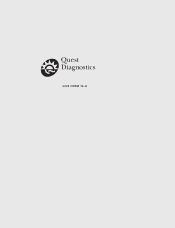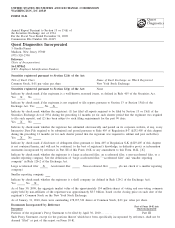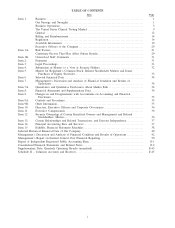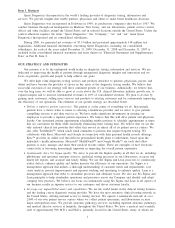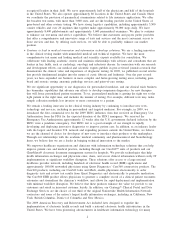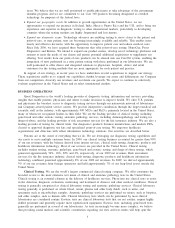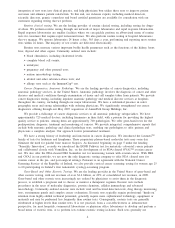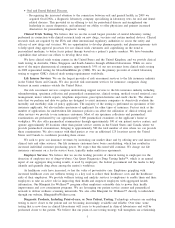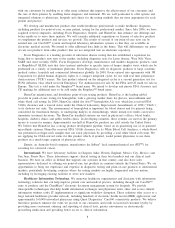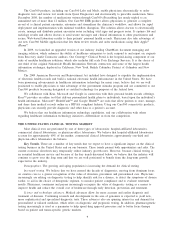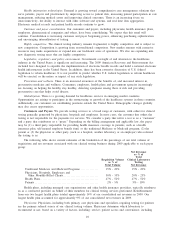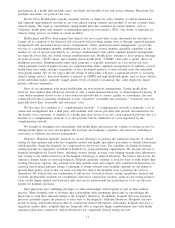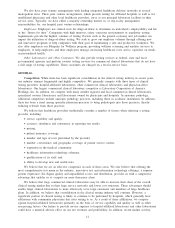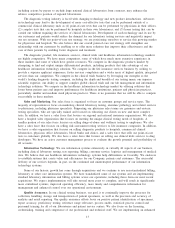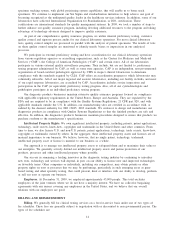Quest Diagnostics 2009 Annual Report Download - page 14
Download and view the complete annual report
Please find page 14 of the 2009 Quest Diagnostics annual report below. You can navigate through the pages in the report by either clicking on the pages listed below, or by using the keyword search tool below to find specific information within the annual report.integration of new tests into clinical practice, and help physicians best utilize these tests to improve patient
outcomes and enhance patient satisfaction. To this end, our in-house experts, including medical directors,
scientific directors, genetic counselors and board certified geneticists are available for consultation with our
customers regarding testing that we perform.
Routine clinical testing. We are the leading provider of routine clinical testing, including testing for drugs-
of-abuse. We perform routine testing through our network of major laboratories and rapid response laboratories.
Rapid response laboratories are smaller facilities where we can quickly perform an abbreviated menu of routine
tests for customers that require rapid turnaround times. We also perform routine testing at hospital laboratories
that we manage. We operate laboratories 24 hours a day, 365 days a year, performing and reporting most routine
tests within 24 hours. The majority of test results are delivered electronically.
Routine tests measure various important bodily health parameters such as the functions of the kidney, heart,
liver, thyroid and other organs. Commonly ordered tests include:
•blood chemistries, including cholesterol levels;
•complete blood cell counts;
•urinalyses;
•pregnancy and other prenatal tests;
•routine microbiology testing;
•alcohol and other substance-abuse tests; and
•allergy tests such as the ImmunoCaptest.
Cancer Diagnostics; Anatomic Pathology. We are the leading provider of cancer diagnostics, including
anatomic pathology services, in the United States. Anatomic pathology involves the diagnosis of cancer and other
diseases and medical conditions through examination of tissue and cell samples taken from patients. We provide
cancer diagnostics testing, including inpatient anatomic pathology and medical director services at hospitals,
throughout the country, including through our major laboratories. We have a substantial presence in select
geographic areas and strong relationships with ordering physicians. We significantly strengthened our cancer
diagnostics offering through our May 2007 acquisition of AmeriPath Group Holdings, Inc.
We provide a full-range of cancer diagnostic services to all anatomic pathology subspecialties. We have
approximately 725 medical doctors, including luminaries in their field, with a passion for providing the highest
quality service to patients. Among them are approximately 700 pathologists. We offer gene-based tests for the
predisposition, diagnosis, treatment and monitoring of cancers. We provide integrated, comprehensive reports that
include both anatomic pathology and clinical pathology tests, enabling our pathologists to offer patients and
physicians a complete analysis. Our approach fosters personalized treatment.
We have a strong history of leadership and innovation in cancer diagnostics. We introduced the LeumetaTM
family of tests for leukemia and lymphoma. These proprietary plasma-based molecular tests may some day
eliminate the need for painful bone marrow biopsies. As discussed beginning on page 5 under the heading
“Scientific Innovation”, recently we introduced the EGFR Pathway test for metastatic colorectal cancer patients
and collaborated closely with Vermillion, Inc. on the development of its FDA-cleared OVA1TM ovarian cancer
test. We also offer the FDA-cleared HE4 biomarker test for monitoring women with ovarian cancer. With HE4
and OVA1 in our portfolio, we are now the only diagnostic testing company to offer FDA cleared tests for
ovarian cancer in the pre- and post-surgical settings. Pursuant to an agreement with the National Cancer
Screening Service of the Republic of Ireland, we also provide cervical cancer screening testing for women age 25
to 60 participating in Ireland’s first nationwide cytology-screening program.
Gene-Based and Other Esoteric Testing. We are the leading provider in the United States of gene-based and
other esoteric testing, with net revenues of over $1.4 billion, or 20% of consolidated net revenues, in 2009.
Gene-based and other esoteric tests increasingly are ordered by physicians to assist them in the diagnostic
process, to establish a prognosis and to choose or monitor a therapeutic regimen. Esoteric tests include
procedures in the areas of molecular diagnostics, protein chemistry, cellular immunology and advanced
microbiology. Commonly ordered esoteric tests include viral and bacterial detection tests, drug therapy monitoring
tests, autoimmune panels and complex cancer evaluations. Esoteric tests typically require professional “hands-on”
attention from highly-skilled technical personnel, generally require more sophisticated technology, equipment or
materials and may be performed less frequently than routine tests. Consequently, esoteric tests are generally
reimbursed at higher levels than routine tests. It is not practical, from a cost-effectiveness or infrastructure
perspective, for most hospitals, commercial laboratories or physician office laboratories to develop and perform a
broad menu of esoteric tests, or to perform low-volume esoteric testing in-house. Such tests generally are
4


